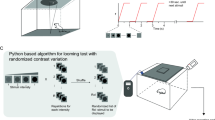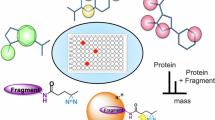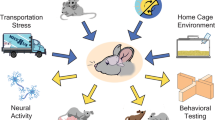Abstract
A pentadecapeptide isolated from the brain of rats trained to avoid the dark has been chemically identified and its structure confirmed by synthesis. It induces dark avoidance in untrained animals.
This is a preview of subscription content, access via your institution
Access options
Subscribe to this journal
Receive 51 print issues and online access
$199.00 per year
only $3.90 per issue
Buy this article
- Purchase on SpringerLink
- Instant access to the full article PDF.
USD 39.95
Prices may be subject to local taxes which are calculated during checkout
Similar content being viewed by others
References
Ungar, G., Galvan, L., and Clark, R. H., Nature, 217, 1259 (1968).
Ungar, G., and Fjerdingstad, E. J., in Biology of Memory (edit. by Ádám, G.), 137 (Akadémiai Kiadó, Budapest, 1971).
Neuhoff, V., von der Haar, F., Schlimme, E., and Weise, M., Hoppe-Seyler's Z. Physiol. Chem., 350, 121 (1969).
Neuhoff, V., and Kiehl, F., Arzneimittel-Forschung, 19, 1898 (1969).
Biermann, K., Cone, C., Webster, B. R., and Arsenault, G. P., J. Amer. Chem. Soc., 88, 5598 (1966).
Desiderio, D. M., Ungar, G., and White, P. A., Chem. Commun., No. 9, 432 (1971).
Merrifield, R. B., J. Amer. Chem. Soc., 85, 2149 (1963); Biochemistry, 3, 1385 (1964); Adv. Enzymol., 32, 221 (1969).
Bayer, E., Eckstein, H., Hägele, K., König, W. A., Brüning, W., Hagenmaier, H., and Parr, W., J. Amer. Chem. Soc., 92, 1735 (1970).
Schnabel, E., Ann. Chem., 702, 188 (1967).
Bodansky, M., and Williams, N. J., J. Amer. Chem. Soc., 89, 685 (1967).
Bodansky, M., Ondetti, M. A., Levine, S. D., and Williams, N. J., J. Amer. Chem. Soc., 89, 6753 (1967).
Sieber, P., and Iselin, B., Helv. Chim. Acta, 51, 614 (1968); 51, 622 (1968).
Parr, W., and Holzer, G., Z. Physiol. Chem., 352, 1043 (1971).
Litchfield, jun., J. T., and Wilcoxon, F., J. Pharmacol. Exp. Ther., 96, 99 (1949).
Gay, R., and Raphelson, A., Psychon. Sci., 8, 369 (1967).
Fjerdingstad, E. J., Nature, 222, 1079 (1969).
Wolthuis, O. L., Arch. Intern. Pharmacodyn., 182, 439 (1969).
Golub, A. M., Epstein, L., and McConnell, J. V., J. Biol. Psychol., 11, 44 (1969).
Ungar, G., Perspectives Biol. Med., 11, 217 (1968).
Ungar, G., in Molecular Mechanisms in Memory and Learning (edit. by Ungar, G.), 149 (Plenum Press, New York, 1970).
Ungar, G., Inter. Rev. Neurobiol., 13, 223 (1970).
Ungar, G., in The Structure and Function of Nervous Tissue (edit. by Bourne, G. H.), 4 (Academic Press, New York, in the press).
Author information
Authors and Affiliations
Rights and permissions
About this article
Cite this article
UNGAR, G., DESIDERIO, D. & PARR, W. Isolation, Identification and Synthesis of a specific-behaviour-inducing Brain Peptide. Nature 238, 198–202 (1972). https://doi.org/10.1038/238198a0
Received:
Revised:
Issue date:
DOI: https://doi.org/10.1038/238198a0
This article is cited by
-
What history tells us VI. The transfer of behaviours by macromolecules
Journal of Biosciences (2006)
-
Scotophobin resurrected as a neuropeptide
Nature (1986)
-
Role of RNA and protein synthesis in memory formation
Neurochemical Research (1979)
-
Molecular-epigenetic aspects of phylo- and ontogenetic memory
Neuroscience and Behavioral Physiology (1978)



